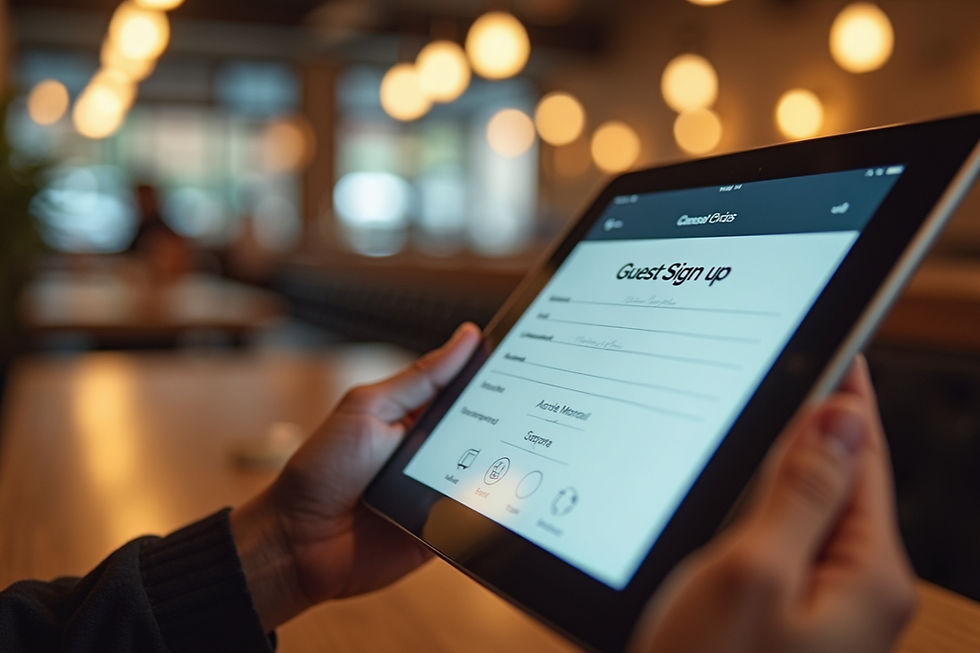Navigating the Legal Minefield of Guest Data Collection in Restaurants
- Amelia Roberts

- May 29, 2025
- 4 min read
In today's technology-driven world, collecting guest data is crucial for restaurants aiming to enhance customer experiences and tailor their offerings. However, this responsibility comes with significant risks. It is vital for restaurant owners and managers to understand the legal challenges associated with gathering and utilizing guest data. This blog post will guide you through the complexities of data collection regulations, helping you avert common legal pitfalls while ensuring a respectful relationship with your customers.

Understanding Data Protection Laws
Understanding data protection laws like the General Data Protection Regulation (GDPR) in Europe and the California Consumer Privacy Act (CCPA) in the United States is essential. These regulations dictate how businesses can collect, store, and process personal information. For example, GDPR mandates that businesses may face fines of up to 4% of their annual global revenue for non-compliance. This underscores the importance of not only understanding these laws but also actively fostering trust with your guests. By being transparent about how you use guest data, you can significantly enhance customer loyalty.
Transparency and Consent
A major legal risk in guest data collection is the failure to obtain proper consent. Customers must be informed about what data is being collected, why it’s needed, and how long it will be retained.
Adopting an opt-in strategy rather than an opt-out approach is crucial. This means guests should actively give their permission before any data collection starts. For instance, when guests book reservations or sign up for newsletters, you can use simple checkboxes to secure their consent. Studies show that 73% of consumers prefer clear, opt-in consent models when sharing their information, making this approach beneficial for restaurant-client relations.

Data Minimization
Data minimization is about collecting only what you truly need. Over-collecting data not only risks violating legal guidelines but can also erode guest trust.
For instance, if your restaurant collects email addresses to send newsletters, you should avoid asking for unrelated personal information like social security numbers. A study revealed that businesses that minimize data collection experience 30% fewer data breaches. Focus on gathering data that directly enhances the guest experience, like dietary preferences or feedback after visits.
Rights of the Guests
Many data protection laws grant guests specific rights concerning their personal information, including the right to access and delete their data.
As a restaurant, it’s essential to have systems in place to uphold these rights. For example, invest in user-friendly software that allows guests to access their data upon request or delete it easily. Failing to comply can lead to severe penalties. The CCPA, for instance, directs that businesses can be fined up to $7,500 per violation if they do not address consumer requests appropriately.

Secure Data Storage
After collecting guest data, ensuring its security is paramount. Data breaches can lead to losing customer trust and incur high costs. According to IBM, the average cost of a data breach exceeds $4 million.
Utilizing robust cybersecurity measures, such as encryption and secure servers, is essential. Additionally, regular training for your staff on security protocols can further bolster compliance. Encourage employees to recognize phishing attempts and stress the importance of protecting customer information, as 60% of small businesses that suffer a data breach close within six months.
Third-Party Data Sharing
When collaborating with third parties—be it for marketing, payment processing, or delivery services—ensure they adhere to the same data protection laws.
Drafting clear contracts is vital, stipulating how guest data may be shared and used. Avoid sharing personal data without explicit guest consent. In 2021, nearly 79% of consumers expressed concern about how their personal information is shared with third parties, illustrating the need for strict data sharing policies in your restaurant.

Regular Compliance Audits
Regularly auditing your data collection practices can help you identify compliance issues and mitigate risks. Schedule routine reviews of your policies and employee training sessions to keep everyone informed about current legal requirements.
Maintaining comprehensive records of your data collection activities is also useful. This not only demonstrates compliance during audits but also acts as protection should any legal challenges arise.
Create a Data Privacy Policy
A well-drafted, accessible data privacy policy is crucial. This document should clearly outline your restaurant's approach to data collection, usage, and storage.
Make this policy easily available on your website, and encourage guests to read it when signing up for services. Transparency in this area fosters trust and shows respect for guest privacy.

Conclusion
Navigating the legal intricacies of guest data collection in the restaurant industry requires careful attention and understanding. By grasping data protection laws and implementing sound practices, restaurant owners can create both a safe and trustworthy environment for their guests.
Remember that transparency and consent act as your greatest allies in nurturing long-lasting guest relationships. Through regular audits, secure storage methods, and clear policies, you can not only remain compliant but also feel confident in your data collection practices. By prioritizing guest privacy and security, restaurants can focus on delivering outstanding service and memorable dining experiences.
Want more compliance and restaurant insights? Explore our blog—like, share, and drop your questions in the comments!
---
Frequently Asked Questions
Do restaurants need consent to collect guest data?
Yes. Clear, opt-in consent is legally required before collecting any personal guest information, especially for marketing or analytics.
What laws should restaurants be aware of?
The most relevant are GDPR (for EU residents) and CCPA (for California), both of which regulate data collection, usage, and guest rights.
Can restaurants be fined for non-compliance?
Absolutely. Fines range from thousands to millions of dollars depending on the severity of the violation and governing laws.
Is sharing guest data with third parties allowed?
Only with explicit guest consent and proper contracts in place to ensure third-party compliance with the same privacy standards.
What’s the best way to store customer data securely?
Use encrypted servers, limit access, and train staff regularly. Also, run routine audits to detect risks and reinforce protection.



Comments